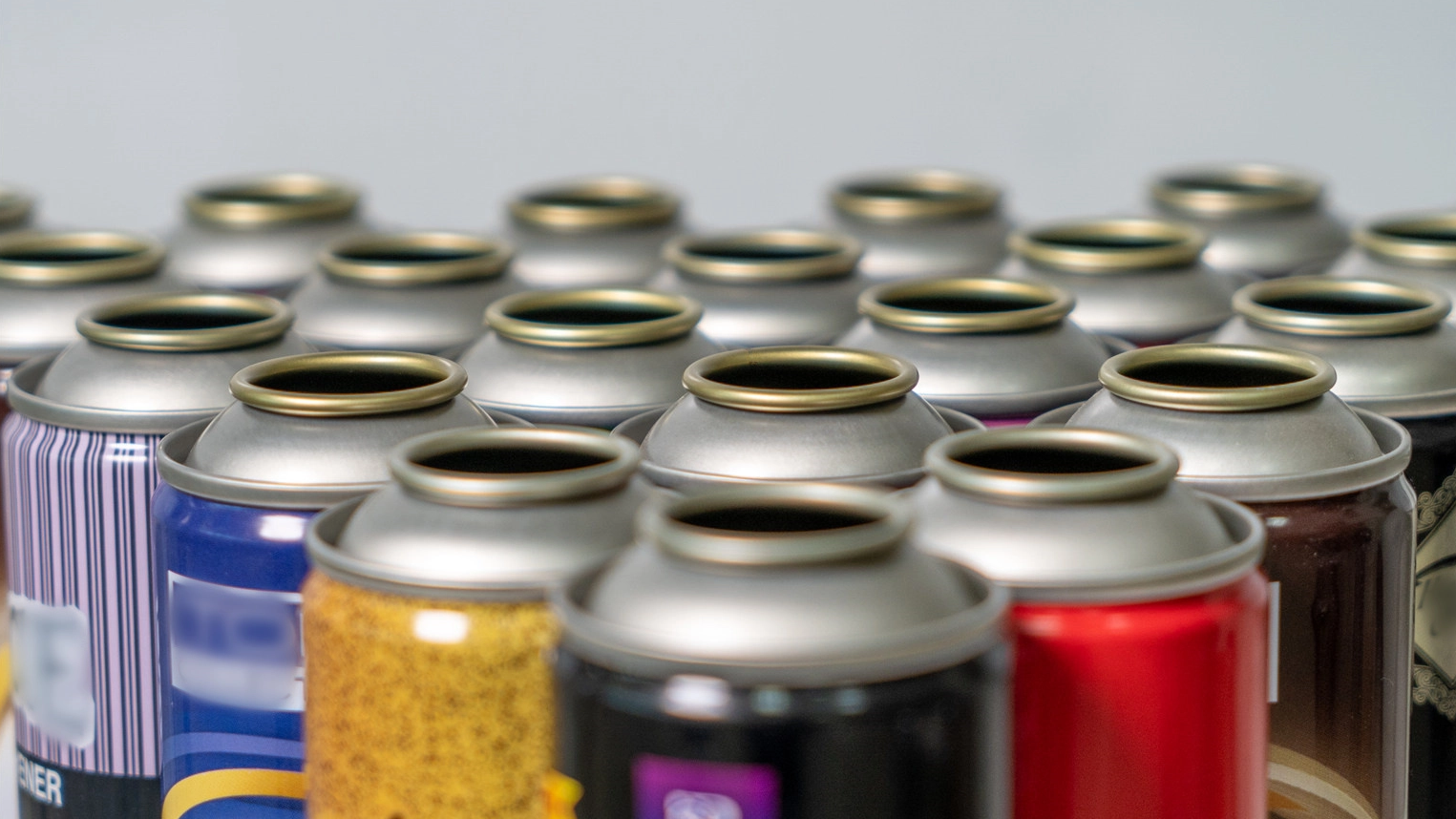- All
- Product Name
- Product Keyword
- Product Model
- Product Summary
- Product Description
- Multi Field Search


Views: 0 Author: Site Editor Publish Time: 2025-07-21 Origin: Site









An aerosol can is a container designed to hold liquids, gases, or powders under pressure, allowing them to be dispensed as fine sprays or mists when the nozzle is activated. The mechanism relies on a propellant, typically a liquefied gas like butane or propane, which forces the product out through a valve system. Aerosol cans are commonly used in products such as hair spray, paints, cleaners, and insect repellents.
The structure of an aerosol can typically includes:
The can body, usually made of aluminum or steel, which provides durability and corrosion resistance.
The valve system, which controls the release of the product.
The propellant, which creates pressure inside the can.
The product itself, which could be a liquid, foam, or powder.
Hengyu Can, a leading manufacturer, emphasizes high-quality materials and leak-proof designs to ensure safety and efficiency. Their products undergo rigorous testing to meet international standards, reducing the risk of leakage or rupture. Modern aerosol cans also incorporate environmentally friendly propellants, aligning with global sustainability trends.
Despite their convenience, aerosol cans are not without risks. Understanding their composition and function is the first step in mitigating potential dangers.
Aerosol cans pose several hazards, primarily due to their pressurized contents and chemical composition. The dangers can be categorized as follows:
When exposed to high temperatures or physical impact, aerosol cans can rupture violently. The propellant inside expands rapidly when heated, increasing internal pressure until the can bursts. According to safety studies, aerosol cans can explode at temperatures as low as 120°F (49°C), depending on the propellant type and can integrity.
For example, butane, a common propellant, has a boiling point of -0.5°C (31°F). When heated, it turns into gas, occupying more volume and exerting immense pressure. If the can is damaged or the valve is compromised, this pressure can cause an explosion, sending metal shards flying at high speeds.
Hengyu Can addresses this risk by using reinforced valve systems and thickened can walls, which are less prone to rupture. Their products also feature overpressure relief vents, which release excess pressure before the can bursts, reducing the risk of injury.
Many aerosol products contain flammable solvents or toxic chemicals. When sprayed, these substances can accumulate in enclosed spaces, creating explosive atmospheres or health risks if inhaled. For instance, paint spray often contains acetone or toluene, which are highly flammable and irritating to the respiratory system.
Additionally, some propellants, like propane, are asphyxiants in high concentrations. If an aerosol can leaks in a confined area, the gas buildup can displace oxygen, leading to dizziness, loss of consciousness, or even death in extreme cases.
Hengyu Can mitigates these risks by using safer propellants and ensuring their valves are tightly sealed. Their aerosol cans also come with clear warning labels, advising users to avoid open flames and poor ventilation.
Improper handling can lead to cuts or bruises. If an aerosol can is punctured or crushed, the contents can spray out at high velocity, potentially causing chemical burns or eye injuries. Furthermore, if a can is shaken violently before use, the propellant can mix with the product, leading to an uncontrolled burst when the nozzle is pressed.
To combat this, Hengyu Can designs their aerosol cans with ergonomic grips and durable materials that resist dents. Their product testing ensures that even under stress, the cans remain structurally sound.
Proper storage is critical to preventing accidents with aerosol cans. Here are key guidelines:
Store aerosol cans in a cool, dry place, away from direct sunlight.
Avoid temperatures above 120°F (49°C), as this increases the risk of explosion.
Never store aerosol cans in a hot car or near heat sources like stoves or radiators.
Keep aerosol cans upright, never on their sides or upside down.
This prevents propellant mixing with the product and ensures the valve functions correctly.
In workplaces or storage areas, ensure good airflow to prevent gas buildup.
If storing large quantities, use ventilated cabinets or outdoor storage.
Avoid stacking aerosol cans too high, as this can cause dents or leaks.
Use shelving or bins to keep them stable and protected.
Hengyu Can emphasizes safe storage in their user manuals, providing diagrams of proper positioning and temperature ranges. Their aerosol cans are also designed to be stackable, reducing the risk of damage during storage.
Workplaces that use aerosol cans—such as auto repair shops, painting facilities, or hair salons—must implement strict safety protocols. The Occupational Safety and Health Administration (OSHA) provides guidelines to minimize risks.
Employees should be trained on proper handling and emergency procedures.
They must understand the hazards of flammable propellants and chemical exposure.
Work areas should have mechanical ventilation to prevent gas accumulation.
Local exhaust ventilation is recommended when using aerosol sprays.
No smoking signs should be posted in areas with aerosol cans.
Fire extinguishers should be readily available, preferably Class B (for flammable liquids).
Flammable storage cabinets are ideal for large quantities of aerosol cans.
Hengyu Can offers commercial-grade aerosol cans with leak-proof designs, reducing workplace hazards.
By following these measures, businesses can significantly reduce the risk of accidents and ensure compliance with regulatory standards.
F: What is in an aerosol can?
Q: Aerosol cans contain a product and a propellant under pressure. The propellant, often a liquefied gas like butane or propane, pushes the product out of the can when the nozzle is pressed, creating a spray or mist.
F: Are aerosol cans okay to recycle?
Q: Aerosol cans are made with either aluminum or steel, which makes them suitable as a recyclable material. The fact that they contain pressurized air, and sometimes harmful materials, makes the preparation for aerosol can recycling critical.
Copyright © 2024 HengYu Aerosol Can. All Rights Reserved. Sitemap | Supported by leadong.com 粤ICP备2024338468号